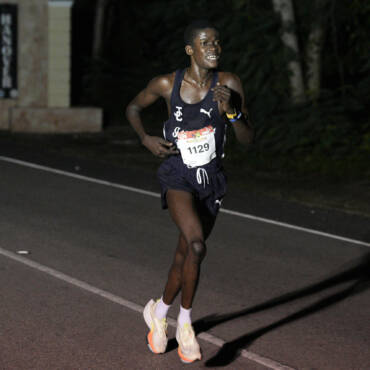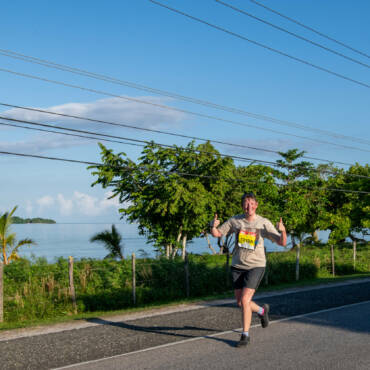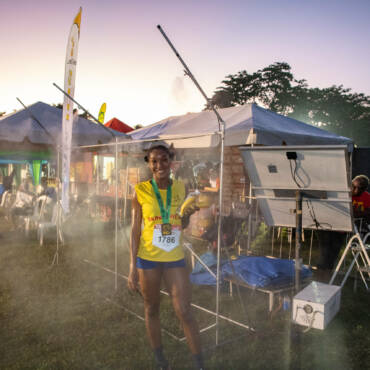Last week Reggae Marathon’s ‘Ask Dan’ shared some tips on what to do after a race. In Part 2 of his response, he shares some additional tips:
- Once you are beyond the official race finish area and “on your own” easy walking is still a good bet, as long as you have no serious conditions that make it a bad idea.
- Continuing with the ‘just keep moving’ theme, possibly the best I ever came off post-race was at the New York City Marathon. With 40,000 runners and associated supporters plus the huge crowds that turn out to cheer you on, post-race vehicular transportation was just a silly dream. I wound up walking 3-4 miles back to the hotel. Best thing I could have done.
- More substantial food over the next few hours is an important part of your recovery plan. Most of my longer races include a planned post-race brunch or celebration with family or running friends. There is always a big emotional return through the stories you will share and celebration of your achievement. And, in Negril – reggae music!
- If you feel that your running extremities deserve a soak, start with COLD water. You have been abusing your legs for a long time and in simple terms, what you may be feeling is a form of inflammation. That includes tissue swelling, not necessarily of a visible sort, and blood pooling. While it may seem instinctively right to get into a soothing hot bath or hot-tub, just the opposite is what is recommended, to the point of immersing in an ice-bath for as long as you can stand it. The objective is to immediately stop tissue swelling and begin to reverse it. In Negril you can settle for standing in the cool(ish) sea water. It won’t quite be an ice-bath – BETTER NOT BE! However, the water will be lower than body temperature. Cold soaks will reduce swelling of tissues. Later, you can go for the warm soak to get blood flowing and clearing the residual metabolic ‘nasties’ like lactic acid.
- Some believe compression-wear really reduces blood pooling in the extremities even if you only use such gear after you run. Personally, I run most marathons with short or full compression tights, depending on conditions. Cuts down on chaffing issues too.
- A bit of sleep may be a welcome aspect of the early post-race period. The Reggae Marathon starts at 5:15 AM and you WILL be up a whole lot earlier, if you actually manage to sleep much the night before. It won’t hurt you much if you are too wired to sleep the night before. A lot of running theorists will tell you it
is the night before the night before that counts. A good sleep two nights before your race pays big dividends.
- Remember that you probably still want to be watching your re-hydration. I am only speaking here of normal de–hydration experienced by most people in a distance race, not the physiologically serious situation that finds a person hooked up to an IV bag of saline solution. Most runners I know subscribe to the ‘pee test’. Unless you have been eating/drinking something strange, urine should be very light in colour and clear. If you are producing a trickle of highly coloured urine you can be pretty sure you need to get some liquids into you. Do it sensibly though. Don’t go looking for the nearest 5 gallon water jug and chug the whole thing. Did I mention hyponatremia? Yes, I did.
- The first day of the rest of your life, aka the day after the race, you will want to keep the easy movement going. I know quite a few more serious runners who will be out for a very light jog, just to move the legs and some of that lactic acid. For most, a walk will do fine.
- Watch out for jumping on an airplane immediately post-race. If you must, those compression tights can really help. Myself, I have concluded that a week of rest and relaxation after the Reggae Marathon is totally justified, so I’m only going up the road a bit until the next weekend.
- As that first week goes on, some good walks and even a modest run or two will put you back in top form.
- Remember though, that regardless of your pace, you just did something major if you ran the half or full marathon – the 10K too, but you will soon see why I put it in a different category. There is an old rule of thumb that says for every mile you race, you need a day of rest. That doesn't mean no running, but it does mean no hard running and especially, NO RACING. Our 10K folk will have run 6 miles, so if they want to race a week later, they can. A half marathoner needs two weeks without racing and a full marathoner should be looking at almost a month. This is just a guideline and depends on many things, but it isn't a bad concept to consider.
- In most cases, a week after your race, you should be feeling pretty good physically. Hopefully you will be over the moon emotionally. Although racing isn’t recommended, you should be able to start getting back into regular running and enjoying it. Strenuous training should wait a bit longer and racing – well, see the last point.
So, there you have a few thoughts on post-race do’s and don’ts starting with the Finish Line photo and ending when you are just about ready for your next race.
Until next time…
Reggae Marathon RunninGuy
(Note: photo courtesy of Errol Anderson Photography)



